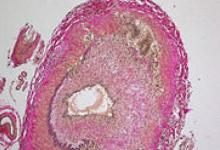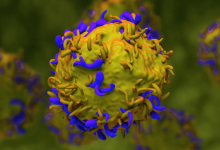The folly of dietary restriction in contemporary gout? Save

Gout has historically been considered a disease of the financially rich, rich in diet, and rich in alcohol. This legacy frequently results in contemporary patients reporting that they are adjusting their diet to try and control their hyperuricaemia and gout, often deferring urate-lowering treatment to attempt this. A number of abstracts at ACR 2020 In Saturday’s poster and abstract sessions addressed this topic.
Dr Murdoch in abstract 0646 presented an analysis of negative depictions of gout in film and television and how this perception may impact negatively on our care of patients with gout. This is clearly an important issue and a societal view of gout as a comical disease where sufferers are afflicted due to their own misdeeds has clear negative implications for our attempt to provide quality gout care.
It is important to consider whether diet influences gout and if so, what is the magnitude of that effect? Dr Yokose presented data on the relationship between hyperuricaemia and fast food intake in abstract 0552. This data was part of the CARDIA prospective cohort study. Fast food consumption had a strong positive association with serum urate. There was an extra 0.21mg/dL increase in those consuming the highest intake of fast food. The authors suggested that this was likely mediated by weight gain and changes in insulin resistance. This study provides clear evidence of an influence of diet on serum urate. However, those with the most extreme diet had at most a modest increase in serum urate.
Dr Merriman presented further data on the role of diet in gout in abstract 0951. It was found to be minor, especially compared to urate lowering therapy. In this study the authors used population attributable fraction to compare the effects of various factors on serum urate. The average attributable fraction was approximately 10-fold greater for urate lowering therapy than for following healthy-eating guidelines. The authors also used mendelian randomization to test for a causal role of diet in determining serum urate. The results showed only a weak causal effect for diet on serum urate that was mediated by BMI.
My own interpretation of this data is that while dietary factors certainly do influence urate levels and thereby gout risk, this effect is modest particularly compared to that of urate lowering therapy. Therefore, I feel that we can allow our patients to have a normal diet, within reason, and optimise the dosing of their urate lowering therapy to achieve that goal. We have highly effective treatments for reducing serum urate available to employ to this end. An overly restrictive diet can take much of the joy from life and the benefits may not justify the sacrifice.










If you are a health practitioner, you may Login/Register to comment.
Due to the nature of these comment forums, only health practitioners are allowed to comment at this time.